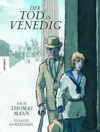As Thomas Mann marks his 150th birthday this year, his legacy looms larger than ever. The Nobel laureate’s novels remain perennial bestsellers, his views on democracy and society are quoted daily in the press, and his presence is felt not only in libraries, but also across the stages, screens, and studios of the world. From theater and opera to ballet, film, literature and even graphic novels, Mann’s work continues to inspire new generations of artists eager to reinterpret his stories for contemporary audiences.
To understand what draws creators to Mann today, Marlene Hartmann of the Buddenbrookhaus in Lübeck and Timo Daus of Humboldt University in Berlin invited artists from across the arts to reflect on their personal and professional connections to his work. Why Mann, and why now? What is it about his language, his characters, and his themes that compels adaptation in so many forms? And how do these artists hope to reach new audiences—including young people—with stories first penned a century ago?
Their answers, collected here, reveal a deep admiration for Mann’s prose and a fascination with the psychological complexity of his characters. Many respondents cite the enduring relevance of Mann’s explorations of doubt, identity, and existential anxiety in a time of war in Europe—qualities that continue to resonate in an age of uncertainty. For these artists, adapting Mann is not merely an act of homage; it is a way to bring the great questions of modern life to the stage—and to invite audiences to find their own reflections in his work.
Trailer for the Burgtheater’s 2023 stage adaptation of THE MAGIC MOUNTAIN, directed by Bastian Kraft, capturing Hans Castorp’s surreal journey in a Davos sanatorium.
Theater: Directors and Dramaturgs Respond
The stage has long been a proving ground for Mann’s literary imagination. After a long hiatus, Vera Sturm’s 2001 adaptation of THE MAGIC MOUNTAIN at the Reichenau Festival marked a new era for Mann in the theater. Playwright John von Düffel has since dispelled the myth that Mann is “unperformable,” with his 2005 BUDDENBROOKS adaptation at Hamburg’s Thalia Theater opening the door for regular stagings of Mann’s major works-including THE MAGIC MOUNTAIN, DEATH IN VENICE, and CONFESSIONS OF FELIX KRULL-on German-speaking stages.
There is no more fundamental novel about the bourgeois family than Thomas Mann’s Buddenbrooks.
There is no more profound novel about the roots of religion and religiosity than Thomas Mann’s Joseph and His Brothers.
There is no more insightful fragment about imposture than Thomas Mann’s Felix Krull.
That is why I have adapted Thomas Mann for the stage.
Opera: Composers Respond
Opera has also found inspiration in Mann’s work, most famously in Benjamin Britten’s iconic 1973 adaptation of DEATH IN VENICE. In recent years, composers such as Robert Grossmann, Marc L. Vogler, and Ludger Vollmer have brought new operatic interpretations of THE MAGIC MOUNTAIN, FELIX KRULL, and BUDDENBROOKS to the stage, while Gregory Vajda’s MAGIC MOUNTAIN premiered at the Davos Festival.
Many of the challenges humanity faces today-war, turbo-capitalism, the relationship between men and women, even questions of gender-were already present in Mann’s BUDDENBROOKS. We can say that the central problems of the twenty-first century have roots in the nineteenth-a truth the war in Ukraine tragically underscores.
Trailer John Neumeier’s haunting ballet DEATH IN VENICE, inspired by Thomas Mann’s novella, with Edvin Revazov as Gustav von Aschenbach and Caspar Sasse as Tadzio. Set to music by Bach and Wagner, the Hamburg Ballet’s production explores obsession, longing, and the final dance between life and death.
Ballet: Choreographers Respond
In ballet, John Neumeier’s DEATH IN VENICE: A DANCE OF DEATH stands as a classic, fusing Mann’s intellectual world with music by Bach and Wagner. Where Mann’s novella keeps Aschenbach and Tadzio at a distance, Neumeier’s choreography expresses their longing through dance. Xin Peng Wang’s adaptation of THE MAGIC MOUNTAIN explores the theme of “time” and its impact on the human psyche, reflecting on society’s response to pandemics and ideological divides.
A charming impostor ascends through Belle Époque society in Bernhard Sinkel’s lush 1981 adaptation of Thomas Mann’s classic.
Film: Directors and Screenwriters Respond
No Mann work has been adapted for the screen more often than CONFESSIONS OF FELIX KRULL, with Bernhard Sinkel’s 1981 miniseries among the most notable early adaptations. Sinkel embraced the challenge at a time when literary adaptations were out of fashion, drawn to Krull’s own penchant for performance and reinvention. Adrian Illien’s 2023 espionage series DAVOS 1917 draws on both THE MAGIC MOUNTAIN and REFLECTIONS OF A NONPOLITICAL MAN, finding contemporary echoes in Mann’s depiction of a Europe on the brink. In 2024, André Schäfer’s biopic CONFESSIONS OF THOMAS MANN offered a bold, playful vision of the author’s inner life-reimagining Mann as an androgynous, liberated figure who finally lives out the desires recorded in his diaries.
Reading is an act in black and white: black letters on white paper. The color comes from what I paint between the lines in my mind. With Thomas Mann, there are a great many lines-and even more in between.
For a documentary filmmaker, that’s doubly intriguing-especially when the man behind those lines is something like the pin-up boy of literary history. Four thousand photographs, all posed. All a performance?
Fiction, Biography, and New Genres: Writers Respond
Writers, too, continue to find new ways to engage with Mann. Alain Claude Sulzer’s DER PERFEKTE KELLNER and Hans Pleschinski’s KÖNIGSALLEE reimagine episodes from Mann’s life and fiction, while Inger-Maria Mahlke’s UNSEREINS challenges the mythic image of Lübeck in BUDDENBROOKS by confronting issues of antisemitism and class. Unda Hörner and Stefan Bollmann situate Mann in the broader sweep of European cultural history, and Thomas Sparr’s ZAUBERBERGE explores the contemporary resonance of Mann’s key themes. Recent works range from graphic novels to youth and crime fiction, with authors like Susanne Kuhlendahl and Marco Sonnleitner bringing Mann’s world to new audiences and genres.
About Timo Daus
In his dissertation project at Humboldt University in Berlin, Timo Daus analyzes how contemporary multimedia adaptations of Thomas Mann's literary works-in theater, opera, ballet, film, as well as in literary and (fictional) biographical publications-contribute to current social discourse. After nearly 30 years as a partner in management consulting, focusing on advising CFO organizations of global corporations, he pursued studies in European Literature, completing his degree with a thesis on "Thomas Mann and Democracy: His Conceptual Understanding and Democracy-Relevant Statements in Lotte in Weimar."
About Marlene Hartmann
Marlene Hartmann studied German, English, and Romance languages and earned a master’s degree in literature and media with a thesis on the queer feminist cinema of Céline Sciamma. She completed her academic traineeship at the Buddenbrookhaus.







